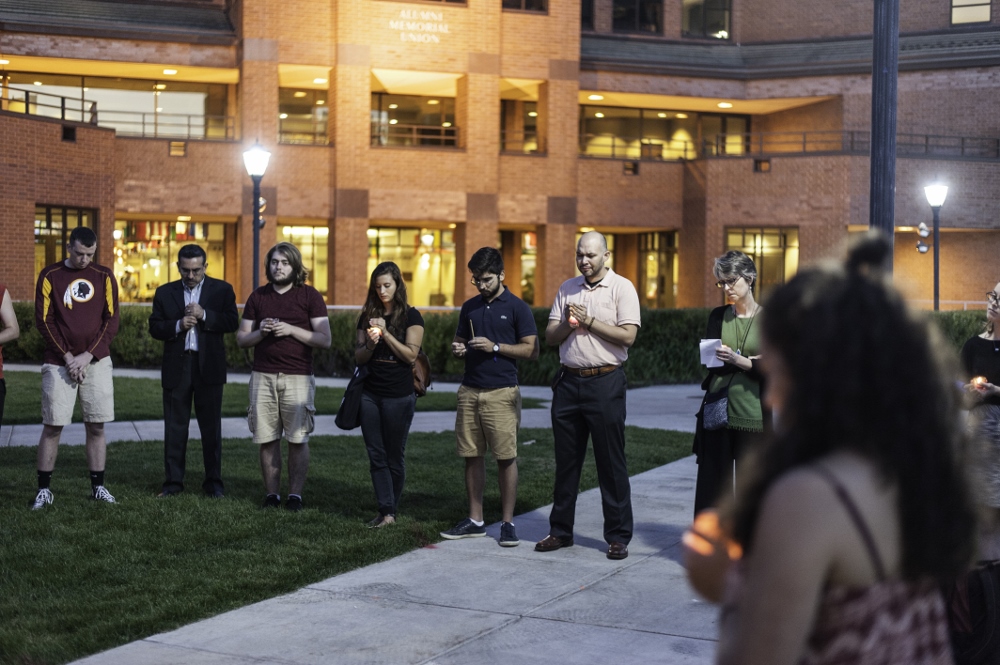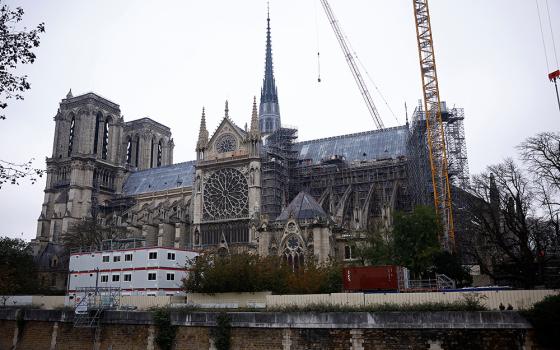
A prayer service at Marquette University in Milwaukee in 2016 (Courtesy of Marquette University)
Kaitlyn Daly, a 2017 Marquette University graduate, was raised Lutheran in a Chicago suburb and had never attended a private school before. "Coming to Marquette was an interfaith moment in itself," she said.
In her freshman year, Daly realized values of her Lutheran faith were similar to values she encountered on campus. But she felt the Campus Ministry office was centered on the Catholic faith.
"There were all these different faiths represented, but I didn't feel they were totally inclusive with Campus Ministry," Daly said. Individuals in the Campus Ministry office were always welcoming, but the structure as a whole didn't feel very inclusive, she added.
In 2018, there were 1,292 freshmen students who identified as being Roman Catholic out of 2,162 freshman students, according to Marquette's Office of Institutional Research and Analysis. Religious affiliation trends are collected from students on their admission application.
There are a number of religious resources at the Milwaukee school. Besides the Roman Catholic programs, the university offers the Canterbury Fellowship for Anglican or Episcopalian students, Cru for Christian students, Jewish Student Union, Intervarsity Christian Fellowship, Lutheran Campus Ministry, Orthodox Church in America and a Muslim Student Association.
Mary Sue Callan-Farley, director of Campus Ministry, was hired in 2012. Before coming to Marquette, she worked at St. Peter's University in New Jersey, which she said had a diverse Jesuit campus community. Marquette's Campus Ministry had already built a good foundation of interreligious relationships, but there is always more work to be done, she said.
"The mission of the university is one that engages the world and calls us to find God is in all things and people," Callan-Farley said. "The Jesuit tradition in higher education is global. It is important to recognize that a Jesuit, Catholic university has an obligation to promote justice and the dignity of the human person. As a learning community we struggle together, with people of different faiths and backgrounds, to create a culture where these ideas are strengthened."
Irfan Omar, a theology professor at Marquette, wonders whether Campus Ministry staff members are well equipped to minister to students who are non-Christians or nonbelievers.
"There is certainly an awareness to address that question; Marquette has already had ministers from other faiths or denominations which included Lutheran and Jewish," he said. Although resources are available, the reach of these non-Christian ministers remains limited, he added.
While there has been religious vandalism on Marquette's campus, including vandalism to the Muslim prayer space in 2017 and to the eucharistic chapel in the Alumni Memorial Union, Callan-Farley said these acts often mirror the current social culture.
"We have to honor each person in their own tradition, seeking unity when we can, which is pretty often in the area of human concern and deep desire to know God," she said.
She said she hopes interfaith engagement will increase to strengthen a culture at Marquette that reflects the university's commitment to inclusion and the Catholic tradition of intentional dialogue with people of all faiths.
Thomas Moore, a student on the interfaith coordinating team, said the university should better handle outward racism or sexism. "It's a problem in the country and it's a problem on Marquette's campus," he said.
The interfaith coordinating team is a group within Campus Ministry that works to foster productive dialogue on campus, according to Moore. While last academic year there was a mix of many different students, many of them graduated and this year only two students are involved.
Daly created the interfaith coordinating team in August 2016 with three other students. Originally, the team would get together on a regular basis to talk about promoting interfaith dialogue.
"In the first core team we had, there was a very organic movement that happened. They wanted to go back to their [own] groups and bring the knowledge and growing up they did to put their tools into action, which is the main reason we have these dialogues," said Bernando Ávila-Borunda who works with the multicultural ministry.
While Moore said the Interfaith Coordinating Team has dwindled, events continue on campus, such as an Advent Ecumenical LGBTQ+ Prayer, a Mass of Our Lady of Guadalupe with a Posada procession and a reception, Camina Conmigo, a Latinx community retreat, and MUmoja, an African American retreat.
Afnan Musaitif, hired in September 2017, is the university's first Muslim campus chaplain.
"The year before I was hired, there was some anti-Muslim rhetoric on campus. Tensions increased and the university felt meeting the needs of the students was important," she said.
"Knowing that the university cared enough to create this position, that was a validating move on campus; basically saying, 'Your lives matter,' " she said.
This year, there are 32 Muslim students in the freshmen class, or roughly 1 percent of students on Marquette's campus. In 2004, there were nine Muslim students, and the number has been generally increasing each year since then, according to the Office of Institutional Research and Analysis.
Advertisement
"Right now, the focus is on improving the amenities in the faith," Musaitif said. "We have prayer rooms available, but the students have noticed that the carpeting has worn out significantly."
Ávila-Borunda said the Muslim prayer space, located in the Alumni Memorial Union, provides space for students to pray and to also reserve for services and programming. Next door, there is an Interfaith Meditation Space open daily for individual prayer and meditation.
With the addition of The Commons dorm and dining hall, a multipurpose faith room was added along with the St. Therese of Lisieux Chapel. Other groups on campus have also worked to get a private space to practice their faith. Callan-Farley said there is a Center for Jewish Life in Straz Tower, along with an ecumenical chapel.
"From a campus planning perspective, we want to provide spaces throughout our campus that allow the community of faculty, staff and students to practice their faith and spirituality," said vice president for planning and strategy Lora Strigens.
The multipurpose faith room at The Commons has a big-screen television for programming, showcasing song lyrics, or calligraphy for Muslim services, and a place for ablution and foot-washing for Muslims required before prayer. The Chapel of the Holy Family, located in the Alumni Memorial Union, hosts Lutheran services on Sundays.
The Rev. Jessica Short, a pastor with the Evangelical Lutheran Church of America, has been part of the affiliated ministry at Marquette since 2009.
On Tuesday nights, she cooks dinner for students, and they eat together in Wehr Physics, an academic building on campus.
Short holds her "office hours" in Starbucks, because there is no space on Marquette's campus exclusively for Lutherans. She has a shared office space in Campus Ministry, but all events need to be planned and approved. With no defined space, she said that makes it difficult to build unity or fellowship.
This academic year, there are 123 Lutheran students in the freshmen class, a decrease since 2004 when there were 151, according to the Office of Institutional Research and Analysis.
Short hopes to be included in any discussion concerning a possible interfaith center on campus.
"There was no place at the table for a lot of us that simply wanted to hear what's going on, [and] reflect upon what an interfaith center could look like. We don't have a big plethora of interfaith resources on campus," she said.
Strigens said there are always discussions about enhancing the student experience in the campus master plan. "Relative to faith spaces, groups like Mission & Ministry, Student Affairs, the student voice, and others are critical to that dialogue," she said.
Daly said she hopes Marquette can continue to welcome interfaith conversations.
"I would love to see more diversity within Campus Ministry, in even just the faces who walk the wing in Campus Ministry," she said.
"I would hope to see a group of students who have interfaith dialogue as one of their priorities, something that is able to inspire younger students to get involved and become leaders," Ávila-Borunda said.
[Sarah Lipo is a sophomore at Marquette University in Milwaukee. She is a journalism and social welfare and justice major and is minoring in political science.]






